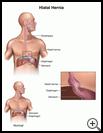
Hiatal Hernia
________________________________________________________________________
KEY POINTS
- A hiatal hernia is a condition in which part of the stomach pokes through the diaphragm up into the chest. Usually it does not cause symptoms or problems.
- Treatment is usually not needed if you have no symptoms. If you have symptoms, treatment may include quitting smoking, changing your diet, or losing weight. Your healthcare provider may prescribe medicines or you may need surgery.
- Ask your healthcare provider how to take care of yourself at home, and what symptoms or problems you should watch for and what to do if you have them.
________________________________________________________________________
What is a hiatal hernia?
A hiatal hernia is a condition in which part of the stomach pokes through the diaphragm up into the chest. The diaphragm is a muscle between your chest and belly that helps you breathe.
Hiatal hernias are common after middle age. Usually they do not cause symptoms or problems.
What is the cause?
The exact cause of hiatal hernias is not known. They happen more often after age 50 and in people who smoke or are overweight.
What are the symptoms?
Many people with a hiatal hernia never have any symptoms. However, in some cases it causes stomach acid to flow back into the esophagus. The esophagus is the tube that carries food from your throat to your stomach. The backward movement of stomach acid is called reflux. Symptoms of reflux may include:
- Burning pain or warmth in your chest or throat, usually in the breastbone area
- Bitter or sour taste in your mouth
- Belching and a feeling of bloating or fullness in your stomach
- Frequent unexplained dry cough
How is it diagnosed?
Because many hiatal hernias do not cause symptoms, they are often found during exams for other problems. Your healthcare provider will ask about your symptoms and medical history and examine you. Tests may include:
- Barium swallow, which is an X-ray taken of the upper part of your digestive tract after you swallow barium. Barium is a liquid that helps your esophagus and stomach show up well on the X-ray.
- Endoscopy, which uses a slim, flexible, lighted tube passed through your mouth to look at your esophagus and stomach
How is it treated?
Treatment is usually not needed if you have no symptoms.
If you have heartburn or other symptoms of reflux, your healthcare provider may recommend or prescribe:
- Lifestyle changes such as quitting smoking, changing your diet, or losing weight
- Medicine to lower the acid in your stomach
If your symptoms are severe and are not controlled by changes in your diet, weight loss, or medicine, your provider may recommend surgery to repair the hernia.
How can I take care of myself?
To feel better and prevent problems:
- Follow your healthcare provider’s treatment plan. Take your medicines exactly as prescribed.
- Take nonprescription antacids after meals and at bedtime, according to your provider’s recommendation.
- Eat smaller, more frequent meals. Avoid overeating and late-evening snacks or meals.
- If certain foods or drinks seem to cause your symptoms or make them worse, avoid those foods.
- Try to keep a healthy weight. If you are overweight, lose weight. Extra weight puts pressure on your stomach. The pressure can cause stomach contents to push up into your esophagus.
- If you smoke, try to quit. Smoking can increase stomach acid. Talk to your healthcare provider about ways to quit smoking.
- Wear loose fitting clothing without belts.
It may also help if you:
- Sit up during meals and wait 2 to 3 hours after eating before you lie down. It’s best not to eat for 2 to 3 hours before you go to bed.
- Raise the head of your bed 6 to 8 inches by putting the frame on wood blocks. If you cannot raise the frame of the bed, try placing a foam wedge under the head of your mattress. Sleeping on your left side may also help. Just using extra pillows will not help.
- Chew sugarless gum after meals. Some studies have shown that this decreases reflux.
Ask your healthcare provider:
- How and when you will get your test results
- How long it will take to recover from this illness
- If there are activities you should avoid and when you can return to your normal activities
- How to take care of yourself at home
- What symptoms or problems you should watch for and what to do if you have them
Make sure you know when you should come back for a checkup. Keep all appointments for provider visits or tests.

